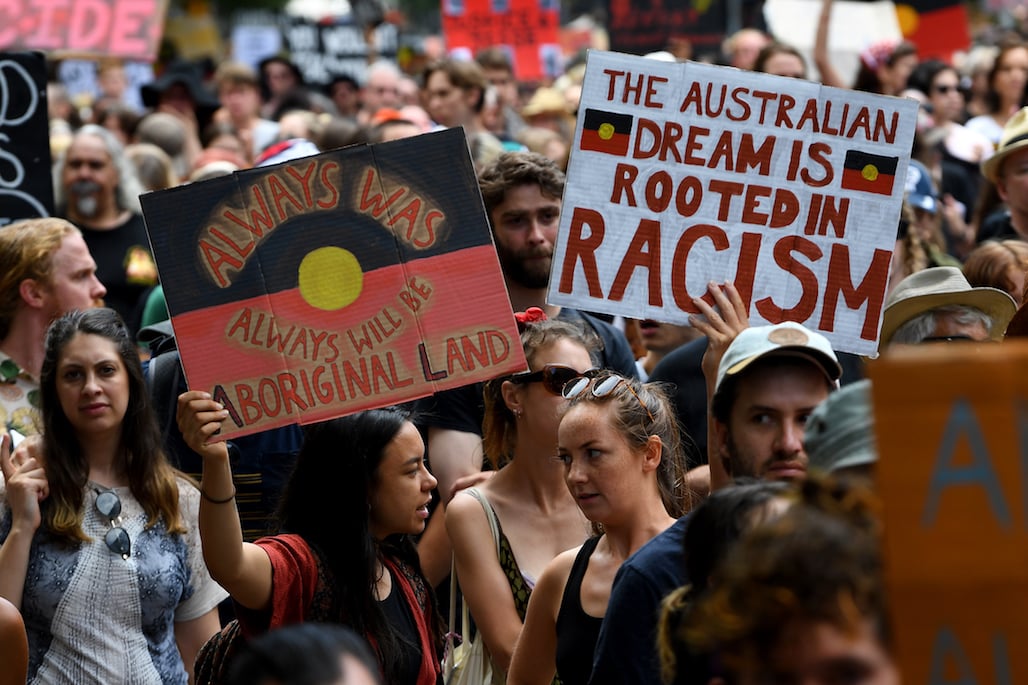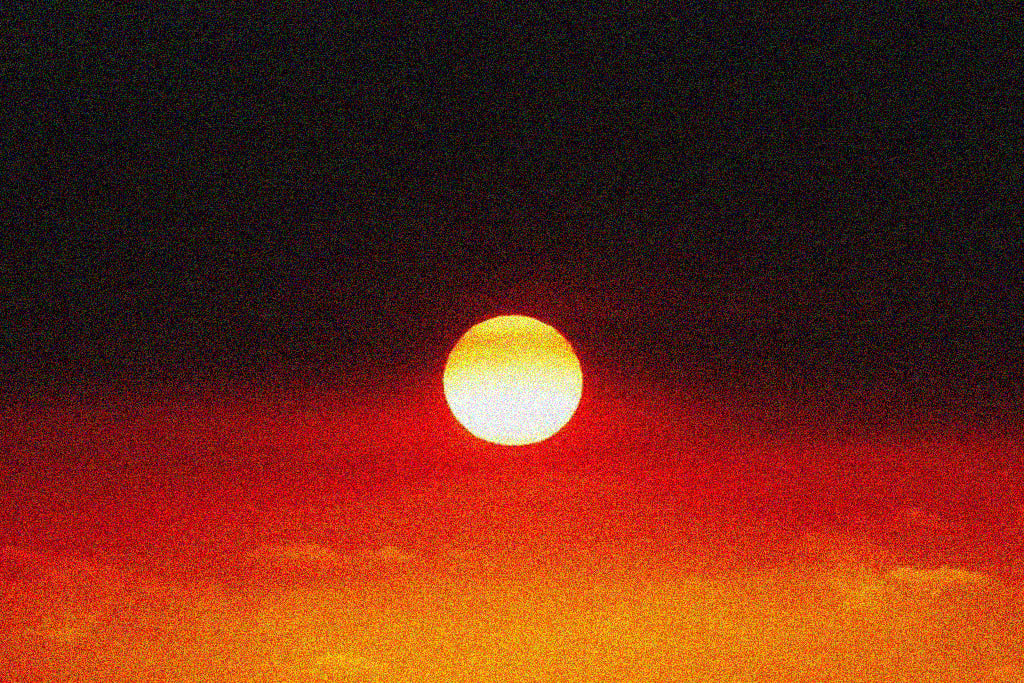The Revolution Starts By Cutting Carrots: How To Show Real Solidarity After Invasion Day
What happens in this 364 day space between now, and next Invasion Day?

You’ve turned up to the rally, but what next?
Every year on Invasion Day we see an amazing upsurge of energy across the community. A massive wave washes through the major cities and towns, where hundreds of thousands of people gather. They march together. They listen, radiating out from our circles. The crowd steps shoulder to shoulder in the same direction, the tide so big that you can’t even see where it begins, or where it might stop.
My name is Tim Buchanan, I am of Wiradjuri descent, and along with Amy Thunig and Lynda-June Coe, I co-ordinated the Invasion Day Rally for Newcastle this year.
There is negative media and social media backlash, but in that crowd, I breathe deeper and I can feel the unifying element.
There are moments in the crowds where you stop and suddenly become aware of where you are… like, things are possible, maybe we’ve got this.
It’s powerful to see the support from the non-Indigenous community on invasion day. I always have a little quiet cry while I’m moving about. Unashamed, I let these emotions wash over.
This crowd, and water, is hope.
What happens in this 364 day space between now, and next Invasion Day?
But then the rally closes, and that swell recedes and seems to flow back for an entire year.
I get ready for the Invasion Day emotional-hangover in the week following where the racists come out in full force. And as I see everyone float off after such a powerful day, I wonder:
What happens in this 364 day space between now, and next Invasion Day?
What happens in this gap between that surge — the ocean that we briefly see rise up, and the lonely land that we walk on daily?
How can we shore up consistent energy and what does that look like?
Why do so many people subside after such an inspiring day? Where is it that they go?
And how do we articulate true solidarity to those that ask for direction, those are clearly keen?
Today we held our inaugural #InvasionDay march & rally here in Muloobinba/Newcastle 👊🏽🙏🏽 People turned up. Elders shared. Allies put on a massive feed for everyone. It felt strong. I love our community very much. Solid.
📷 Pics thanks to Iron Monkey, Leibot & local legend Georgia pic.twitter.com/1OoyiVEue7— Amy Thunig (@AmyThunig) January 26, 2020
We Need Active Allies
The power of coming together en masse is not insignificant, and more and more we need people to switch from passive participants to active allies. Accomplices.
I have a favourite saying: The revolution starts by cutting carrots.
People need to be willing do the ‘dirty work’ like we do, to question and understand their privilege, and be willing to use it. We need those that are complicit in actual liberation, not temporary allyship.
These movements need to extend from showing up, to filling roles throughout the year, in the logistical grind of campaigns, in getting discrete and segmented tasks done.
It’s digging shitpits at a blockade. It’s organising print runs and postering. It’s using your own networks and power to support ours instead of trying to build power in our spaces.
We need you to let us lead. Which, as uncomfortable as it may be to say, means we need people to be willing to listen, and follow.
Cutting Carrots
I have a favourite saying: The revolution starts by cutting carrots.
I think we are so used to the story of white history. Of linear paths and grand lectern speaking. Personalities that in a Hollywood fashion sway societies. It’s an easy story to tell, but it’s an utterly lazy one.
The real story is one of intersecting paths of importance. A myriad of efforts. Humble. Achievable.
Here in Muloobinba/ Newcastle we have been practicing responsibility, we have been practicing cutting carrots.
Despite colonialism.
Despite genocide.
Indigenous people are still here.
This is still indigenous land.
All of it.#InvasionDay #AustraliaDayhttps://t.co/mjVqzAUxLD pic.twitter.com/UZjnVA6OeI— The Decolonial Atlas (@decolonialatlas) January 25, 2020
Acting In Solidarity
This year was our first annual Invasion Day rally.
Led by two First Nations women and myself, it came together in two weeks due to the dedication and hard work of people acting in solidarity. And that’s the key word. Action. Performative allyship can often be all talk, whereas solidarity is often running silently in the background.
Performative allies tend to centre themselves because they want the badge, not the dishcloth. And the dishes still need to be done.
When people come in who are trying to ‘help’ or ‘represent’ the ‘disadvantaged’ — the message they send is that the core group impacted, are those they see as below them. But in solidarity, in an accomplice, we understand that our collective struggle is intertwined.
Look for local First Nations campaigns in your area and get involved if that support being asked for.
It was amazing to see the non-Indigenous community come together with us this way, to self-coordinate whole huge sections of the event, then listen and follow the lead of co-ordinators.
Consultation with us Mob organising was of course centred, and we had final say based on our own deeper consultation with community stakeholders and Elder groups, but having the creative energy moving along side us was infectious.
When someone comes to you and says:
“I have the material, donated labour and costs lined up to make a four by seven meter Aboriginal flag for the event, what do you think?”
I think: “Ummmm … Yes!”
They aren’t pushing it; they didn’t seek to brand the flag, nor promote and declare their goodness. They are simply asking for informed consent to move ahead. They are giving you a framework of the idea, which limits the work that First Nations organisers need to do.
This is trust.
Solidarity looks and feels like a self directed organising crew of twenty people who somehow manage to appear on the day and feed hundreds of people. No micromanagement is needed.
You know the vague outline of the ‘what’, but you don’t have to stress about the ‘how’ — they’ve got this. The crowd, the families, the Elders are being fed. You can’t help but look across the park, smile and think:
“Fuck they’re solid…”
And that doesn’t mean there won’t be mistakes and mishaps, from both sides — but if we move forward with transparency and mutual consent then we will be able to overcome them.
It’s seeing the community pillars we are all leaning upon and talking about them.
I’m feeling incredibly full and proud to see images of tens of thousands of protesters showing up and showing OUT against #InvasionDay across the country. Staunch mob and non-Indigenous allies hitting the pavement and elevating our voices ✊🏾
— Kylie Bracknell [Kaarljilba Kaardn] (@IndigenousX) January 27, 2020
So What Does This Look Like In Your Community?
First of all find out who’s land you’re walking on. Do the groundwork. Start your own journey of reading and research, as it’s the essential undercurrent that continues alongside all solidarity work.
Look for local First Nations campaigns in your area and get involved if that support being asked for.
Look for local First Nations campaigns in your area and get involved if that support being asked for.
Again, look through the written material to get on the same basic page that drives the organisation — educating accomplices is often work put onto us that could easily be done by reading the relevant material to the issue or campaign.
Devils advocates don’t bother; this is not your debate club. Many issues have been ‘run and won’. Don’t take space by making us constantly ground reality — genocide is ongoing and systematised, children are being stolen, police are murdering us in custody, abusive extractivist industries are destroying country and culture.
We are here to actively fight that. Straight up. Enter with that sharpened mind.
Best way to mark #invasionday is to #paytherent. Donate to an org like Sisters Inside @debkilroy – they clear fines to have aboriginal people released from custody and reunited with their families. pic.twitter.com/J7ilG9XN0E
— Rebecca Giblin (@rgibli) January 26, 2020
Solidarity Networks
Find the solidarity networks that already exist in your area. A great example is the Anticonlonial Asian Alliance.
If there are none then take the initiative and start one. Work on sustainable structures of support and take the time to build proper local relationships.
Lizzy Jarrett, A Bundjalung Gumbaynggirr Dunghutti woman, recently articulated these essential elements at the annual Students of Sustainability Conference:
If you run a group or organisation, set a standard decolonial agenda item at every meeting. Set it near the beginning so it gets time. Use this time to have serious discussions about decolonial frameworks for your own organisation as well as what solidarity work you have to offer; Resources, time, skills, labour, fundraising. Be proactive, not reactive.
The Endeavour is coming soon. We will need more accomplices.
Organisations and individuals can offer fundraising, material support and labour. Imagine all the elements of a campaign; from on the ground events, to administration, social media coordination, photography and videography, legal knowledge, logistical organising, providing food, travel support, accommodation, technical skills. You don’t have to do everything.
Consider where your skills and privilege already sit and make it functional in support of First Nations self-determination.
This sort of discrete solidarity work allows First Nations organisers to spend more time leading and decision-making. This is vital for our self-empowerment.
And keep in mind that the colonial propaganda machine is about to sail directly at us. The Endeavour is coming soon. We will need more accomplices.
Below is a non-exhaustive list of some groups and campaigns. It’s vital you do research about what’s happening on the Country you benefit from. But jump on and give all these a follow so you can hear from people on the ground:
#250RESIST. Use this hashtag to find info about the Morrison LNP governments attempt at whitewashing history by sailing its invasive warship around the continent this year. Join and help with mobilisations near you.
Groups And Campaigns
Pay the Rent campaign — Support First Nations campaigns directly.
Warriors of the Aboriginal Resistance — WAR
Indigenous Social Justice Association:
State Based Campaigns
QLD
Deebing Creek Sovereignty Camp
VIC
Djab Wurrung Heritage Protection Embassy
SA
NT
Media / Social Media
Twitter: @IndigenousXLtd
The memes formally known as beautiful talented deadly
Black Feminist Ranter – Celeste Liddle
Twitter: @Utopiana
Amy Thunig
Twitter: @AmyThunig
Solidarity Networks
ASEN (Australian Student Environment Network)
FB: https://www.facebook.com/asen.org.au/
Web: https://asen.org.au/
Anticolonial Asian Alliance
Sydney
Tim Buchanan is a Wiradjuri descended activist and community organiser who resides on the unceded lands of the Awabakal people. Working across many groups and coordination roles such as National Co-convener of ASEN (the Australian Student Environment Network), Tim focuses on supporting and articulating Direct Action models of community power as well as creating pathways for First Nations solidarity work. Follow them on twitter @tbuch2.
